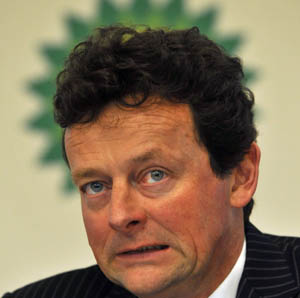The heads of four of the country’s largest oil companies told a House panel Tuesday morning that the explosion of the Deepwater Horizon and subsequent oil disaster was merely a fluke—their companies operate safely and are adequately prepared to deal with any accidents that may occur.
“This incident represents a dramatic departure from the industry norm in deepwater drilling,” ExxonMobil CEO Rex Tillerson told a subcommittee of the House Energy and Commerce panel.
When proper procedures, redundancy, inspections, maintenance, and training are in place, “tragic incidents like this one in the Gulf today should not occur,” said Tillerson. He called the Exxon Valdez spill of 1989 a “low-point” in the company’s history and said it had “launched a full-scale, top-to-bottom review of our operations.” Now, he said, “we do not proceed with operations if we cannot do so safely.”
The other executives, representing Shell, Chevron, and ConocoPhillips, offered similar claims—the Gulf disaster was an aberration, one created by BP’s lack of oversight. John Watson, chairman of Chevron, testified that his company’s “drilling and control practices for deepwater wells are safe and environmentally sound” and that a commitment to safety is fundamental to who we are.”
While Watson called the Gulf disaster “humbling,” he argued that it should not be an impediment to future drilling. “We strongly believe that responsible deepwater development must continue: America needs the energy,” said Watson. “And we can produce that energy safely, including in the deepwater.”
James Mulva, CEO of ConocoPhillips, made a similar plea: “The business of offshore exploration will and must continue. It will continue because we can and will do it safely and responsibly. And it must continue, not only for what it yields for our nation, but also because that’s what America does. We learn new lessons and move forward to higher levels of progress and achievement.”
But as the executives testified about their safety and preparation, congressional Democrats pointed out that their companies’ plans for a similar disaster were basically “cookie cutter” copies of BP’s spill plan, all prepared by the same group, the Response Group. The plans include an assessment of the impact of a possible spill on walruses (which don’t live in the Gulf) and the phone number of an expert who died in 2005 (well before the plans were submitted). “ExxonMobil, Chevron, ConocoPhillips, and Shell are as unprepared as BP,” said Rep. Henry Waxman (D-Calif.).
“The only technology you seem to be relying on is the Xerox machine,” echoed Rep. Ed Markey (D-Mass.).
The hearings are still going; we’ll have more later.















